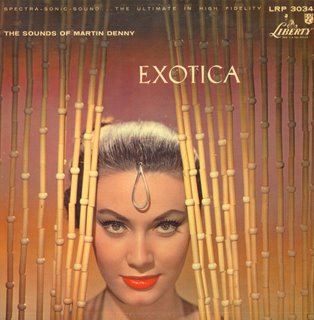
Martin Denny, Quiet Village.
Martin Denny, The Queen Chant (Li Liu E).
To everything there is a season, and today at Locust St. it's time for kitsch.
Ever since Americans began mucking about in the Pacific, from the annexation of Hawaii to the Filipino Insurrection, they have had a taste for the "exotic" sounds from the region, whether it is the Hawaiian guitars that turn up on a host of '20s recordings, or the novelty "island girl" songs of the war years.
But it was after WWII, and around the time of Hawaii's eventual promotion to statehood, that the vogue for "South Pacific" sounds really took hold. It is odd to think that returning GIs would enjoy having some of the grisliest battlefields of the war--Guadalcanal, the Philippines, Midway--reinvented as a sort of schlock Polynesian paradise, but perhaps they just enjoyed revisiting happy memories of the Hawaiian steel bands they had heard on leave. (Most likely, if my late grandfather could serve as a representative of his generation, they simply didn't care.)

Martin Denny called it "the feeling of the South Pacific, the languor, a relaxed sound." Denny had been an intinerant musician, playing in South America before the war. In 1954, he was brought over to Hawaii to work at the Honolulu club Don the Beachcomber, and in the next few years, he became one of the island's most popular musicians, favored by airline staff and tourists. The trick was that Denny's music wasn't "traditional" in any sense--it was a pseudo-Hawaiian gumbo, as authentic as the Tahitian Village in Downey, California. (Fittingly, the "exotic" model on most of Denny's LPs from the '50s was the all-American Sandy Warner.)
Denny also realized the emphasis on steel guitar in Hawaiian music often had a soporific effect on listeners. So he brought in the works: vibes, bongos, gamelans, conch shells, gongs, corrugated gourds, boobams, "and man-sized Burmese temple bells" (Stuart Swezey and Brian King).
One night, playing at the Shell Bar, Denny and his band were quietly starting a typical beachcomber groove, when they became aware of bullfrogs croaking in a nearby pond. As if on cue, the frogs stopped when the tune ended, and resumed whenever the band kicked up again. Inspired, or perhaps a bit sauced, some of Denny's band began shrieking out bird calls as well. Laughing, they called it a night. The next day, people who were at the gig came up to Denny and asked him to "do the arrangement with the birds and the frogs." And so Denny's "Quiet Village" was born.
"Quiet Village" was written by lounge maestro Les Baxter, and when it was released in April 1957 on the Liberty LP Exotica, it would become Denny's signature hit. Much of its charm is due to percussionist Augie Colon, who provides the birdcalls and the "croaks" (via gourd). Denny plays piano, Arthur Lyman vibes and John Kramer is on string bass.
"The Queen Chant", which is on Exotica II, an LP rushed out in October 1957, is a nice, moody track, showing that despite its association with tiki torches and fire god statues, Denny's band wasn't a joke. Again, Colon dazzles, serving as a one-man army of percussion.
Both Exotica and Exotica II can be found on one CD.
No comments:
Post a Comment